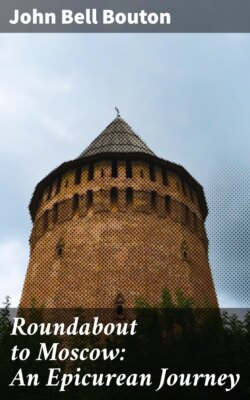Читать книгу Roundabout to Moscow: An Epicurean Journey - John Bell Bouton - Страница 3
На сайте Литреса книга снята с продажи.
PREFACE.
ОглавлениеTable of Contents
If any reader of this book happens to be carrying about a heavy pack of fine old English prejudices, I beg that he or she will drop it before entering upon the eleven chapters relating to Russia. The best preparative for crossing the Russian frontier is to throw out of the carriage-window every English volume with which the tourist has beguiled the way in the vain hope of forming correct impressions of the country ahead.
Englishmen can not be trusted to treat Russia fairly. John Bull hates Ivanovitch. With him the Russian is always a Tartar or a Cossack. Though these terms are not, in fact, opprobrious—since the Tartar of to-day is the model business man of Russia, industrious, faithful, highly respected, and the Cossack preserves none of his ancient traits but an excessive fondness for horses, a martial spirit, and fervent patriotism—they are slurring words in the English sense.
Americans have no cause of quarrel with Russians. There is no Turkey on this continent which we feel bound to save from the jaws of the Russian bear in order to devour her ourselves. We have no distant province with 200,000,000 inhabitants of an alien race, retained by a tenure so precarious that the approach of a rival within 500 miles of the border throws us into a panic. We have no India for Russia to invade. Americans are in a position to do what their English friends have never done—see and report Russia as she is.
If a sense of gratitude for the touching sympathy shown by Russia to the United States at a time when the offensive interference of England in our affairs was strongly feared, shall prepossess the American traveler in favor of that great country and people, there is little danger that he will paint them in colors too bright for truth. For, with his best efforts, he will find it impossible to dismiss all the false anti-Russian ideas with which English literature has filled him. So clinging and powerful is their effect, that he will at times question the evidence of his own senses, and be tempted to discard his personal experience as exceptional and misleading.
I saw no drunken priests reeling through the streets of St. Petersburg and Moscow, and not a single case of intoxication, even among the mujiks. Tea is the national beverage of Russia. Beggars drew but lightly upon the little pocketful of kopecks which I had set apart for them. I lost nothing by theft, and was not defrauded, to my knowledge, under cover of overcharges at the shops or the hotels. Government officers are considerate, polite, and do not seem to be in pursuit of bribes. Russians of the lowest class are not more unclean in appearance than the corresponding grade in England. The “rough” who infests London and Liverpool is unknown in St. Petersburg and Moscow.
If external indications are any guide, I should call the Russians the most religious people in Europe. They build more churches, adorn them more sumptuously, attend service oftener and in greater numbers, repeat more prayers, and perform more devotional rites every day, than the men and women of any other land. There are shrines at almost every street-corner, and every house has its Icon. The Russian type of face is serious. Unfriendly critics note this as an infallible sign of national despair, the overt manifestation of which is that revolt against God and Man called Nihilism. But it is only the characteristic gravity of semi-Orientals, for such are the Russians. They are not down-trodden; and, out of their 100,000,000 free souls, there is a proportion of Nihilists no larger, probably, than that of Socialists in Germany, Communists in France, “Dynamiters” in London, or Anarchists in Chicago. The Tsar enjoys the confidence and love of the vast majority of his people. Russia may safely challenge the rest of Europe to exhibit a parallel to the comparative progress, social and political, which she has made in the past thirty years. When the Cossack waters his horse in the Bosporus, and looks down into India from his outpost in the Solyman Mountains, jealous powers will lament his irresistible advance. But Americans can not share their regrets, believing that civilization and liberty may be borne in his train as surely as in that of any other aggressive member of the great European family.
The record of “An Epicurean Journey” is not a place for the discussion of controverted matters. And my sole object in writing this preface is to explain to the possibly surprised reader why I can not echo that censure of Russian institutions and aims which is the burden of so many English books and magazine and newspaper articles. But I have not gone out of the way to praise Russia, or to do her more than simple justice. That a far greater number of Americans annually may include her in their European rounds, and count their stay in Russia as among the most agreeable episodes of their lives, is the sincere wish of
J. B. B.
New York, May, 1887.
